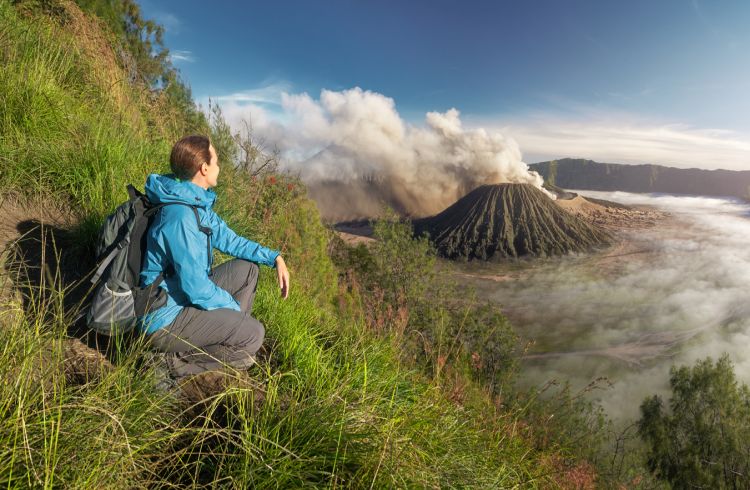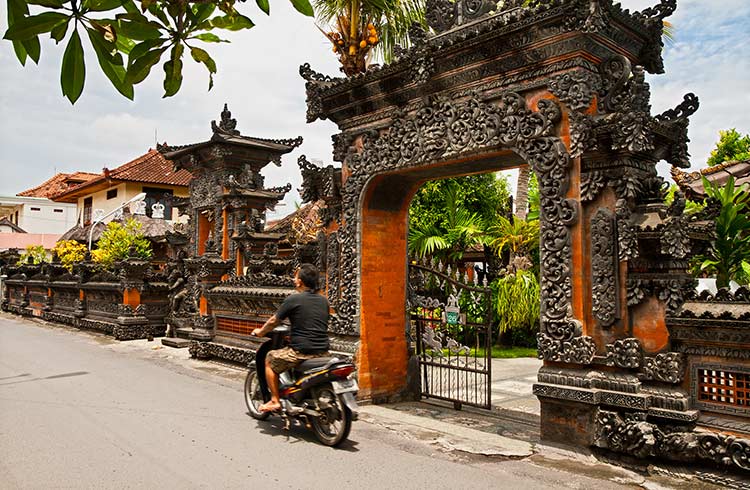Travel Health in Indonesia: How to Avoid Bali Belly
Beyond Bali's beaches and clubs, there are some health concerns for travelers. Here's a few to avoid to stay healthy and safe in Indonesia.
 Photo © iStock/Soft_Light
Photo © iStock/Soft_Light
In recent years there have been a few health and safety issues affecting travelers to Bali. Outbreaks of rabies, Zika virus and Dengue fever have occurred however it's the run of the mill conditions which often strike travelers down such as Bali Belly, Malaria, sunburn and heat stroke or exhaustion. Find out how to stay healthy on your trip with these tips before you go to Indonesia.
- Medical treatment in Indonesia
- Vaccinations recommended for Indonesia
- Mosquito borne diseases
- Bali Belly
- Seafood poisoning
- Alcohol poisoning
- Magic mushrooms
- Black henna tattoos in Bali
- HIV/AIDS
- Sunburn and heat stroke-exhaustion
- Air pollution in Indonesia
Medical treatment in Indonesia
Medical treatment varies throughout the island of Java. In the touristy centres of Bali and in Jakarta, you'll find medical clinics dedicated to treating travelers offering a high level of care. While you may pay more than the local medical facilities, it's worth it for peace of mind given their expertise in knowing which hospitals are the safest plus experience in dealing with medical insurance companies should that be required. They can also arrange medical evacuations to Australia, Singapore or Bangkok.
In terms of pharmacies or drug stores (apotik), stick with your large chains like Kimia Farma. Smaller pharmacies in both urban and rural areas can often stock out of date and fake medications.
If taking any medications, it's important you carry them in their original packaging with the prescription. Some medications which are generally accepted to use in the US, Australia and other countries such as strong painkillers like codeine and sleeping pills are considered illegal narcotics in Indonesia. To save any potential hassles, grab a letter from your doctor explaining what each medication is used for and make sure you declare them upon arrival.
For those traveling to Indonesia for scuba diving, you will find hyperbaric (decompression) chambers at Bali's Sanglah General Hospital, Manado (Sulawesi), Makassar (Sulawesi), Kalimantan, Jakarta (Java) and Surabaya (Java).
The main emergency number is 112 and for ambulances is 118. Bear in mind, it can be quicker sometimes to jump in a taxi to hospital than call for an ambulance.
Vaccinations recommended for Indonesia
Indonesia has no Yellow Fever risk however if you are traveling to Indonesia from a Yellow Fever endemic country, you will need proof of vaccination before entering.
Rabies
More than 150 reported deaths since 2008 have occurred in Bali due to a rabies outbreak. In 2016, one medical clinic reported treating approximately 1000 dog bites per month.
In Balinese culture, dogs are considered holy creatures, so it's common to see stray dogs walking along beaches, nosing through trash or engaging with travelers. However, rabies spreads fast among dogs, and all it takes is one bite for the deadly disease to jump to humans.
Balinese authorities have, with great success, been attempting to combat the outbreak by vaccinating every dog against the disease. With more than 600,000 dogs on the island, this is a challenging task. Rabies spreads faster than health officials can contain it, and the cash-strapped Balinese government cannot always afford the cost of the vaccine. As a result, due to a lack of funds, the outbreak has killed many people.
Jakarta authorities run a successful free vaccination program annually for locals to get their dogs, cats, civets and monkeys vaccinated. This initiative has ensured the capital has remained rabies free since 2004.
Avoid patting the street dogs, stay away from large packs of dogs and don't go out alone in less-populated areas late at night. Monkeys can also carry the disease so don't feed or pat them.
If you are bitten, seek medical assistance immediately even if you have been immunized.
Check that your travel insurance covers medical evacuation as the anti-rabies serum is in short supply on the island, which means the next nearest available supply might be in Singapore or Darwin, Australia. If untreated, or if treatment is delayed, rabies can be fatal.
Hepatitis A and B
Mostly contracted via contaminated food and water, Hepatitis A is a risk for travelers and it's a good idea to get the shots for it as it's prevalent in other destinations globally. Once you have completed the series of three shots, given 6 months apart, you are considered immune for life.
Hepatitis B is transmitted by contact with body fluids e.g unprotected sex and unsanitary medical or tattooing equipment. Like Hepatitis A, you can get a 3 shot series of vaccination which makes you immune for life.
Measles
Cases of measles have broken out occasionally over the years in Bali including in 2017. If you haven't received the measles vaccination as a child, it's advised to get one before you travel. Practising good hygiene also helps prevent catching a case of it. Along with measles, check that your other routine vaccinations are up to date.
Typhoid
Typhoid is transmitted via contaminated food and water. Disease symptoms are similar to many other illnesses such as fever, headache, nausea, muscle ache, constipation or diarrhea so seek medical treatment immediately so you can be treated correctly, as prolonged treatment can lead to serious health complications. Vaccination is recommended before you travel and practising good hygiene while you travel will help minimize the risk of becoming infected.
Tetanus
A potential risk should you cut or graze yourself. Bacteria found in animal faeces or soil can infect the wound, spreading a neurotoxin which impairs your nervous system resulting in spasms and muscle stiffness; the classic signs of tetanus. Not seeking immediate medical treatment can result in blood clots and respiratory failure causing death. If you haven't had a booster shot since the age of 11, you should consider getting one.
Cholera
Recommended if you plan to get off the beaten track in Indonesia where sanitation and medical services will be poor or non existent. Contracted via contaminated food and water, cholera is endemic in the country with the current global pandemic borne from Sulawesi in 1961. The latest number of cases is unknown due to poor reporting. Symptoms include severe dehydration and diarrhea. Medical treatment must be sought immediately.
Mosquito borne diseases
Dengue Fever
Indonesia has one of the highest infection rates of Dengue Fever in the world and with no vaccination available, thousands of locals and travelers to Bali are hospitalized each year. In 2015, there were more than 125,000 reported cases and 1240 people died.
Peak transmission of the virus is during the rainy season which runs from November to April.
Here are a few ways to mosquito-proof your trip:
- Mosquito-proof your accommodation with nets, sprays, mosquito coils or insecticide mats.
- Use maximum strength insect repellants for yourself, and use infant or child-strength repellants for your children.
- Wear loose-fitting, protective clothing to keep from getting too sweaty, as your sweat attracts mosquitoes.
- Don't drink from any natural water sources, and avoid still water e.g ponds, urns where possible.
If you are bitten by a mosquito, monitor it and seek medical treatment if you start to feel unwell. Dengue fever, like any virus, is exacerbated by stress. What might just feel like a minor fever, earache or heat rash, could easily escalate into indescribable pain if you ignore it.
The onset might also include diarrhea, nausea or abdominal pain. If you have any of these symptoms, head to hospital where you can at least relax while under the care of health professionals. Make sure you have plenty of safe water to drink. Unfortunately, all you can do is ride it out.
Malaria
The Centre for Disease Control and Prevention reports that Jakarta, Ubud and the resort areas of Java, Bali, Gili Islands and Thousand Islands are malaria free however there are many parts of rural Bali and other islands where malaria is present so if you plan to travel outside the main tourist areas, it's wise to take an anti-malarial before you go. It's also important to avoid potential bites by covering up, using a DEET based repellent and sleeping under a mosquito net.
Zika Virus
Indonesia experiences occasional outbreaks of Zika virus. Symptoms are similar to other medical conditions so seek medical treatment if you feel unwell.
There is no specific treatment for Zika, only medication to lower the fever and relieve the pain. Like Dengue and Malaria, bite prevention is the best way to deal with the risk of contracting Zika.
Japanese Encephalitis
Another mosquito borne disease, Japanese Encephalitis is prevalent in South East Asia, peaking during the rainy season between November to April. Vaccinations are available in some countries and taking bite prevention measures will also help you lower the risk of contracting it.
Symptoms include fever, muscle aches, headache and disorientation. In worst cases, seizures, neck stiffness, brain damage, coma and potentially death. There is no immediate cure for the disease other than treating the symptoms present.
Bali Belly: How to avoid it
This infamous illness strikes thousands of travelers each year, with the worst cases being hospitalized. Caused by bacteria, it's often contracted via contaminated food and water plus travelers not practising good hygiene. Symptoms include watery diarrhea, dehydration, cramping and occasional vomiting. Seek medical help as you may need a dose of antibiotics to smash it.
You can try to avoid catching it by taking precautions such as:
- Don't drink or the local tap water, stick to treated or boiled water. Even avoid when brushing your teeth
- Making sure food is cooked thoroughly before eating
- Eating fruits and vegetables you can wash and peel yourself
- Avoiding ice cubes and icy drinks if traveling in areas outside the main tourist hubs
- Practising good hygiene while traveling
It's also worth including anti-diarrhea medication in your travel first aid kit.
Ticks
If you are heading out of town, there's a good chance you may find ticks. Always check yourself over when you get back to your accommodation and if a tick has made you its next feed seek medical help. Otherwise the best way to remove it if you can't get to a medical clinic and you have the tweezers to do it:
- Avoid disturbing it before removal such as brushing away or picking at it to minimise the amount of tick venom being injected
- Using the fine point tweezers, hold the tick as close to the skin surface as possible
- Pull the tick upwards and avoid twisting.
- Thoroughly clean the bite site with antiseptic or soap and water. Seek medical attention if you start to feel unwell e.g fever, rash.
Avoid being the next tick banquet by covering up with light colored, long sleeved clothing including tucking your pants into your socks, using a DEET based repellent (apply after sunscreen) and try to walk in the middle of trails rather than close to vegetation.
Bintan Sting
Like several countries in South East Asia, Indonesia is not without the risk of box jellyfish including the locally known "Bintan Sting" however there is no need to panic about taking a dip in the ocean with millions of tourists leaving unscathed each year.
Those who have been stung by a box jellyfish describe the pain as excruciating and most don't know they have been stung until the pain kicks in. Should you or your fellow travelers unfortunately encounter this lethal sea creature, seek emergency medical help urgently while removing yourself or the patient from the water. Apply vinegar to the sting areas and don't scrub them. Remove remaining tentacles with tweezers or gloves. Remain calm and monitoring breathing until medical assistance arrives.
Seafood poisoning
Thousands of cases of food poisoning associated with consuming fish and other seafood are diagnosed each year. There are 3 types of fish toxins which can cause people to fall ill or die: ciguatera, scombroid and shellfish.
Ciguatera - Originates in reef dwelling fish such as mackerel and snapper. Cooking and freezing does not reduce the risk of the toxin. Symptoms such as nausea, vomiting, headache and numbness can appear instantly or several hours after ingestion.
Scombroid - Improper food handling e.g little or no refrigeration fish is the main source of poisoning. In 2014, an Australian woman and her daughter died from scombroid poisoning after consuming mahi-mahi while on holiday in Bali. The toxin in fish such as tuna, marlin and mahi-mahi converts into histamine, with symptoms appearing similar to an allergic reaction within an hour of consumption. Scombroid is often misdiagnosed as a result so should you experience allergy like symptoms such as swelling, itchiness and tingling, seek medical treatment immediately.
Shellfish - Toxins which are ingested by filterfeeding shellfish such as scallops, mussels, oysters and clams can cause allergy like symptoms and sometimes gastroenteritis, which appear up to an hour after consumption. Some toxins can cause nervous distruption which can cause a coma or death.
All three of these poisonings are medically treated based upon the symptoms experienced.
Alcohol poisoning
Many tourists have been fallen seriously ill or died in Bali and the Gili Islands as a result of consuming alcoholic drinks which have been tainted with harmful substances such as methanol. You can't see, smell or taste methanol in drinks so be aware when heading out for the night and only drink at licensed bars and premises with a good reputation.
Pass on drinking the local rice or palm based spirit, Arak. Deaths and poisonings have been reported after consuming arak laced with harmful substances. If you or the person/s you are traveling with suspect that you may have been poisoned, seek medical attention immediately and report all cases of methanol poisoning to the Indonesian Police.
Potential methanol poisoning symptoms to look out for include: blurred vision, dilated pupils, fatigue, nausea, headache and abdominal pain.
Magic mushrooms
Magic Mushrooms and "mushy shakes" can be found for sale in Bali however you risk suffering severe anxiety, hallucinations and psychosis which could put you in dangerous situations out of your control. They are classified as an illegal drug and if you are caught with them, you may see more time inside a jail cell than on the beach sipping cocktails.
Black henna tattoos in Bali
You may see those black henna tattoos being offered by vendors around Bali particularly in Kuta - Avoid them!
The ink contains a hair colorant dye which produces severe skin reactions including blistering and scars. Some vendors will also add pen ink, boot polish and kerosene to the ink.
The kerosene acts as a solvent ensuring the ink seeps deep into your skin. Exposure can also give you lifelong allergies to other dyes and inks.
There are traditional henna artists in Bali which use the reddish-brown ink, so if you plan to get a temporary tattoo, do your homework beforehand and know the difference.
HIV/AIDS
HIV/AIDS is a risk for travelers to Bali due to potential contraction via unsantized tattooing/piercing equipment, unsanitized medical equipment and sexual transmission. Practise safe sex and take caution when getting permanent tattoos or piercings while in Bali. Look for reputable tattoo/piercing places and check that new needles are used each time. Hepatitis B and C are also contracted via tattooing and piercing.
Sunburn and heat stroke-exhaustion
Sunburn, heat stoke and heat exhaustion is common amongst travelers in hot, humid destinations like Indonesia. Bali is hot all year around so for most people it can take some time to acclimatize to the conditions.
Don't roast yourself silly chasing that tan on the beach. Cover up using a strong sunscreen and reapply after you go in the water. Wear a hat and sunglasses and try to avoid strenuous activities between 10am and 2pm. Another important tip: Hydrate yourself regularly with safe clean water.
Symptoms include weakness, increased sweating, headache, slightly higher than normal body temperature and irritability. You can treat this by getting out of the sun, cooling down in a cold bath/shower or applying cool towels to the skin, laying flat with legs raised to maximize blood flow around the body. Rehydrate using room temperature water and sports drinks.
Starting to feel dizzy, confused, uncoordinated and significantly hotter than normal body temperature? These are the signs of heat stroke which is a serious medical condition. It can cause the person to collapse and lose consciousness. Seek medical treatment urgently and start to cool down by removing clothes and applying cool wet towels to the body focusing on the groin and armpits until medical help arrives.
Air pollution in Indonesia
Across Indonesia during dry season, burn offs occur due to palm oil deforestation and agriculture activities. Thousands of tonnes of greenhouse gases are pumped into the air containing chemicals such as carbon monoxide and cyanide, which are harmful to human health. When the burn off smoke is at its worst it drifts towards other South East Asian countries such as Singapore and Malaysia, particularly from fires burning in Borneo.
Jakarta is considered to be one of the most polluted major cities in the world, with around half of the city's population suffering from some kind of respiratory condition due to the smoke haze and transportation pollution.
If you are susceptible to breathing difficulties and plan to Sumatra, Kalimantan, Jakarta or other areas particuarly in north-west Indonesia; ensure that you carry all necessary breathing apparatus and medications with you and consider delaying travel if possible. Bali tends to fair ok during the burn off times in terms of air quality.
Related articles
Simple and flexible travel insurance
You can buy at home or while traveling, and claim online from anywhere in the world. With 150+ adventure activities covered and 24/7 emergency assistance.
Get a quote


No Comments